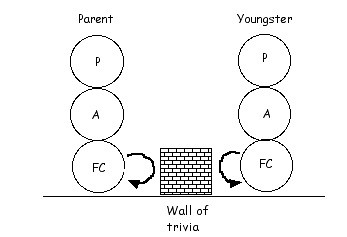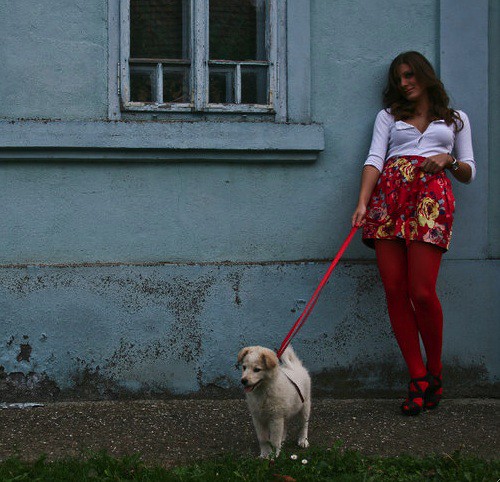This is an associated game of Stupid and is sometimes called the game of Spoilt Child. Here love and money get mixed up. The parents believe they can express their love to a child by giving it things. They may even end up saying to the child, “Of course I love you look at all the things I have given (done) for you”.
The parent is for what ever reason unable to express feelings of love or affection to the child. (Their parents may have done the same to them, they have a “Don’t show your feelings” injunction, they may have their own closeness issues, they may equate affection feelings with sexual feelings and that scares them, they may just be self centred and have little interest in giving affection to the child because they want it themselves, and so on).

So the parents give things instead showing love or affection. A prime example can be boarding school in some instances. “I have sent my daughter to a very expensive boarding school so she gets the best education”, (and by the way it also gets her out of the way so I can go and do all my things).
In this game, over time the child’s bedroom begins to start looking like a shop of “Toys-r-us”. The child gets a never ending series of toys and things with which it can play or be entertained by. Computers, computer games, bikes, flat screen TV, pets, DVD player, CD player, overseas holidays, swimming pool, and so on endlessly. (This is of course encouraged along the way by all the marketing which often portrays the line that if you buy this gift for your child then he/she will feel loved by you.)

The problem with this game is that it half ‘hits the spot’. And that can trick both parties’ Child ego states. They think they are being shown love when in fact they are not. All humans have a need for love. That need can only be fully met when:
It is shown to the person first hand (so not mother telling the child that father loves her)
Is face to face (so not via email or even the phone to some extent)
Has emotion involved
Has some form of physical contact.
If these conditions happen then the Free Child need of the person for love is met and satisfied. Indeed the child will feel loved by its mother or father if the love is expressed to the child in ways like this.


I sometimes hear clients say; “I know my father loved me, even though he never told me that”, or “I used to over hear my father tell others how much he loved me but he never actually told me”. Unfortunately these only half meet that Free Child need for love.
Societies will even formalise times when the Free Child need for love is meant to be met. In our country it is often birthdays, and the birthday gift is meant to be an expression of love for the other person. But the physical gift is only a symbol of that love and to the Free Child that does not mean much.
This is summed up well by Coleman & White (1988), “To clarify this point, consider the example of a parent and child playing a game of cards. We would invite such a parent to consider the following question : Are you playing cards with your child, or are you playing with your child and that just happens to be cards at the moment? Toys, games and play activities can provide an effective way of avoiding contact with a child. They can allow the parent and child to become side-tracked into the activity and avoid closeness, contact or openness with each other. Parents who provide children with expensive toys particularly need to consider how they play with their children.”(P13).

In the wall of trivia ‘things’ get in the way of the two parties actually getting close and having intimacy. The Free Child to Free Child transactions get blocked. Indeed in some marital counselling, the counselling can become a thing that gets in the way as well. It gives both parties a ‘thing’ to talk about other than themselves and their feelings for the other party.
A derivative of the game, “for the love or money” is the game of “Childhood obesity”. In this game love does not get mixed up with an expensive gift but instead love gets mixed up with food. The parent has the mistaken belief that it can express its love to a child by providing it with food and the child begins to take this on and when it feels full it feels loved. So it is provided with lots of food and it eats the food in its desire to feel loved. Again this only half “hits the spot”. For a brief while the Free Child need for love is met when it eats but it does not last because the need is not really getting met in the way I described above. (Note there are many other reasons as well for the over weight child).

The other derivative of the game, “for the love or money” is the game of “Higher, faster, longer”. In this instance love gets mixed up with achievement in the child’s mind. “If I can jump higher, swim faster or run longer then mum will love me”. “If I can win the gold medal then dad will finally notice me” The child believes that if it can achieve success in sport, business, education and so on then the parental love that it craves will finally be given. I would suggest that many high achievers are of this ilk. Again, it works for a little while, and the parents may in fact provide the contact with the child when it does achieve. The problem is there is always another race, there is always more that could be achieved. So the child never gets to the end and often high achievers are left with a hollow feeling as they look at their trophy cabinet, investment portfolio or degrees hanging on the wall.
Graffiti
It is shown to the person first hand (so not mother telling the child that father loves her)
ReplyDeleteIs face to face (so not via email or even the phone to some extent)
Has emotion involved
Has some form of physical contact
Tony this is a interesting list to me. Do you think that these conditions are only required for a parent to show love to a child or are they more universal. Do they apply to adult adult situations as well? It is easy to think of these conditions being met between partners or close adult friends but what about other adults particularly therapist and client.
As a client recently after over three years I've been struggling with the desire to believe my therapist cares for me (I wouldn't use the word love but it has a similar feel to me). Do you think feeling any type of care or concern requires the same conditions.
di
Yes Di
ReplyDeleteI would say they apply to any form of human relationships. Sometimes I suggest another one as well and that is that the transaction also involves eye to eye contact at some point as that throws an extra intimacy factor into the mix.
Regarding a therapist’s love for a client you raise a very good point and a thorny one indeed. Many therapists conveniently side step the issue by saying that therapists dont have love for a client instead they have agape. This allows them to sanitise it and desexualize it and also allows a bit of psychological distance that the word love does not allow.
Weather it is an agape kind of love is another matter but if the therapist can convince self and the client that it is then that solves a lot of very awkward and psychologically troublesome feelings.
You say
As a client recently after over three years I've been struggling with the desire to believe my therapist cares for me (I wouldn't use the word love but it has a similar feel to me).
I dont know you at all well Di , but as a therapist the first thing I would look at here is the possibility of projection on your behalf.
On the other hand, therapists personally care for clients in varying degrees. It depends how much they see their clients as just another case or as an actual person.
It also will vary from client to client. Therapists have personalities like everyone else and thus they will react differently to different clients. Some they will like/love more than others.
Tony
Hi Tony,
ReplyDeleteNowt to say on the post as it isn't something I relate to.
Just a pop in to say hi.
Xxx.
But then again I suddenly find my head filled with two random comments:
A.re your comment above, surely the therapist sees most clients as it is a job to earn money. We all need to work.
B. for me, attention is what I sometimes crave - "to be noticed" - and in some ways I work hard to try and be noticed. But then, I hate attention! Lol! I am the sort of person that brushes off someone's compliment of me, then go home and secretly examine a compliment under the covers and delight in it!
I am pissed. Haven't had a drink for a week as I have had early mornings so Friday night has come early.
Yes therapists do need to earn a living kahless but that does not mean one can not also be emotionally involved with the client to some degree. I think therapists vary widely on this. For some it is only a living and for others it is a passion.
ReplyDeleteRegarding point B. I have always been interested when you say that type of thing. I recall all those photogrpahs you sent me, especially the ones of you with your siblings. You were front and center in many of them. That person in placing them self in a position to be noticed and then I have also heard you say that you do not like attention as you said here.
Quite an incongruency.
Graffiti
Indeed. Definitely an incongruency in me. I have a couple of them.
ReplyDelete